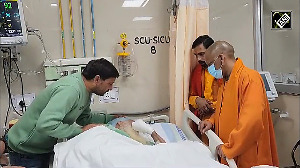It's a scene out of the moviesa well-dressed woman pushing a stroller down the street. In the stroller is an adorable Yorkshire terrier wearing a Louis Vuitton alligator skin designer collar, Prada booties and a reversible Burberry jacket.
Only, it's not a celluloid fantasy; you're more than likely to see this on the streets of your city, as more and more pet lovers are splurging on clothes and accessories for their poochie-pies and kitty-cats.
If you aren't of this number and find it more than slightly bizarre, you may put it down to the eccentricities of the wealthy. Surprisingly, however, it's not just the well heeled who are on a spending spree; cheaper items are now available.
The list includes Nail Pawlish (yes indeed), dog colognes, aromatherapy massages, herbal cosmetics, hair colour sprays... Then there are special pet services including premium salons with professional groomers and cosmetologists, pet psychologists, reiki practitioners, and even pranic healers.
Expensive accessories. Blame Gucci for setting the ball rolling with the launch of its designer collar and lead in 1997. Louis Vuitton and Prada entered the arena the next year, and Chase and Burberry began making dog accessories in 2000. Designer interests aside, the global pet industry is estimated at $38.4 billion.
India is a definite contributor to this booming industry. Mars, the pet-food giant, estimates that there are 3.5 million pet animals across 27 Indian cities. Experts calculate that the pet industry here has a revenue potential of Rs 350 crore (Rs 3.5 billion).
While the market for pet food alone accounts for Rs 250 crore (Rs 2.5 billion), medication, grooming and immunisation adds upto another Rs 100 crore (Rs 1 billion). And, with the pet population growing at 25-26 per cent, these numbers are bound to zoom.
Increasing awareness levels, expanding choices and an exploding market allows pet owners to splurge. "We're definitely seeing an increase in people buying non-essential pet products," says Jayesh Mathur, Delhi-based breeder and owner of The PetStop. Mohan Kadam of Windsor, another pet shop in Delhi, adds: "People come looking for hair colour for their dogs, or cologne or even raincoats."
Ramandeep Chaggar of Chaggars Dogs and Cats Clinic, tells of a client who wanted his Boxer's broken tooth replaced with a special, made-to-order solid gold one; dental charges alone came to Rs 2,000, over and above the cost of the gold. "These trends are part of what the pet industry is calling the humanisation of pets. Pet parlours, designer outfits or leopard skin settees are a natural corollary," says Chaggar.
Pricey pets. Where earlier they'd have been quite content with a mutt from Blue Cross, today's owner looks for breeds and bloodlines. And they are looking beyond the Labs and Poms at the far more expensive toy breeds.
The pug-courtesy the Hutch ads-is popular, but other breeds like the Chihuahua are also seeing a tremendous surge in interest, courtesy Paris Hilton we suppose. This has seen prices of pugs double from Rs 15,000 to about Rs 30,000; Chihuahua costs have spiralled up from Rs 30,000 to Rs 1,20,000.
Mathur adds that the price increase of the animals is also due to an improvement in the bloodstock quality. The Vadehras of Sarva Priya Vihar, who own two Pekingese and a German Shepherd, agree that breeding matters. "We were very particular about the lineage of our dogs and imported all three from Russia even though we paid double of what it would have cost if we had bought them in India," says Vadehra.
It's not just dogs. Mathur says that the potential of the fish trade - we are not talking of the edible ones - in India is encouraging. For instance, he says, "People looking to buy fish now look beyond goldfish and consider buying more exotic species such as the Asian Arowana even though it's priced at Rs 40,000 per fish."
Mathur adds that hamsters, guinea pigs, hedgehogs, and even reptiles such as the bearded dragon and some snakes are becoming very popular. These exotic animals may cost more initially, but are easy to maintain and their food requirement is small, he says.
Pet insurance. Today, when you spend almost as much on buying a pet as you do on a new car, pet insurance is vital. The pet insurance plans available in India generally cover such eventualities as sickness, accidental death and death due to disease, permanent disability due to illness or accident, as well as a public liability cover (when your pet decides to munch on your neighbour's leg, for instance).
Some plans also cover poisoning and breeding risk at an additional premium, usually 0.5-1 per cent more. Typically, insurers do not offer cover against theft, but some of them do customise available policies to include this.
The sum assured is based on the value of the dog, which has to be certified by the local Kennel Club. Premiums are usually 3-5 per cent of the sum assured.
Most of the plans available today cover only dogs. Bajaj Allianz, for instance, offers a cover only for dogs (with a sum assured of anything from Rs 2,000 to Rs 20,000), which is essentially a customised version of its cattle insurance policy.
If you want to insure pets other than dogs, you have fewer options. Iffco Tokio, for one, has a general pet insurance scheme under its 'home and family protector policy', where the cover is limited to Rs 10,000.
Expensive lifestyle. Often, buying a pet is a matter of impulse; after all, it is a particularly hard heart that can withstand the lure of a fat little puppy or a fluffy kitten.
"But this is a serious commitment," warns Rita Goyle, a Delhi-based vet. "Many pets can live for more than 10 years, leaving some pet lovers unprepared for the price tag attached to owning and caring for an animal in a responsible manner," she adds.
And that's the crunch: be prepared for the animal to be a constant drain on your wallet. You will have to account for the associated costs: spaying or neutering, visits to a veterinarian, shots, insurance, food, boarding, toys and grooming.
So, what does it actually cost? If you buy your favourite pet at a pet store or from a breeder, expect to spend anything upwards of Rs 5,000 for a Labrador to several lakhs for a prize-winning German Shepherd. Apart from that, plan on a monthly expenditure of a minimum of Rs 3,000 on a pedigree dogfor its food, vet visits, grooming, tonics, toys and treats.
But it's not all about money, says dog lover Renu Nigam. "If you keep a pet, you must treat him like a child and care for him as such," she says. Nigam gives all five of her dogs a paw massage with coconut oil every night to prevent dryness. She is not alone in indulging her pet. Vadehra used to buy food, treats, vitamins, collars and leashes for all her dogs only from Russia till about a year ago.
|
Expense Account |
| |
|
EXPENSE |
(In Rs) |
PERIODICITY |
|
Food (packaged) |
90-3,000 |
per month |
|
Routine Vet Care (Innoculations) |
1,000 |
per year |
|
Kennel Boarding (optional) |
100-1,800 |
per day |
|
Grooming (professional) |
600-4,800 |
per year |
|
Vitamins (usally for the first year) |
100 |
per month |
|
Treats |
400 |
per month |
|
Toys |
>100 |
as per indulgence |
|
Surgical vet visits (neutering and spaying) |
5,000-10,000 |
in a lifetime |
|
Pet Pricelist | |
|
Animal1 |
COST (in Rs) |
|
Marmoset (pair) |
1.5 lakh |
|
Ferrets |
15,000 |
|
Hamsters |
800-1,000 |
|
Guinea Pigs |
400 |
|
Bearded Dragon (Reptile) |
25,000 |
|
Pacman Frogs |
5,000 |
|
Red Eared Sliders (Terrapins) |
1,500 |
|
African Grey (Bird) |
40,000 |
|
Macaw (Bird) |
1,00,000 |
|
Asian Arowana (Fish) |
40,000 |
|
Prices vary across cities and pet shops. 1Ownership of these animals is legal. | |
|
Doggie bag. In any supermarket today, shelves are devoted to fish flakes, rabbit pellets, dog kibble, cat food and birdseed. Convenience chow has caught on, and pet owners are happy to buy branded dog meals of lamb and rice, and chicken and vegetables. And to keep its Indian clients happy, pet food giant Pedigree also offers a rice and paneer variant, and has cut out beef and pork from its products.
Then there's Choostix-rawhide doggy treats in a wide variety of flavours ranging from the classic beef, chicken, or parsley, to spearmint, cheese, chocolate and mango; Dental Stix for tartar problems, Senior Stix for the arthritic, senior citizens; and Anti-Stress Stix laced with green tea and chamomile and fortified with vitamins.
But all of this costs money. Branded dog food can cost anywhere between Rs 70 to Rs 5,000 for a month's supply. The various Stix on offer cost Rs 90-100 for a packet that may not last too long. But food is one area that owners are not prepared to compromise on. Vadehra, for instance, buys branded foods, and also makes a special liver soup for her German Shepherd, though she is a vegetarian herself.
Looks matter. But feeding, while important, is not all. Grooming is essentialand expensive. A complete grooming package-bath, shampoo, blow dry, nail trim, nail polish, ears clean, massage, and treatment for ticks and fleas can cost about Rs 2,000.
Medical care is another mandatory expense. Consultation charges are generally Rs 100-300, while a home visit will set you back Rs 300-1,000. Then, there's the cost of medicines and vaccines; annual vaccinations for dogs and cats can cost Rs 1,000-1,500. And if you need diagnostic tests, be prepared to spend more: blood tests cost Rs 300-1,000, an x-ray costs Rs 1,000, and an MRI costs Rs 8,000-10,000.
Then there are incidental expenses such as day-boarding facilities and longer boarding for when owners travel. Chaggar runs a day-boarding facility for dogs and claims to have the only boarding facility for cats in Delhi. He charges anything between Rs 200 and Rs 1,800 a day depending on the size of the animal, its dietary and maintenance requirements.
So yes, keeping a pet is an expensive businessunless you're prepared to feed Fido rice and dal and use a jute rope as a leash when taking him for a walk. But that could seriously traumatise the animal when he sees his canine buddies feasting off branded meals and wearing Gucci. And then you'll have to shell out for a pet psychiatrist. No kidding. A pet owner definitely leads a dog's life. |
| It's a Service Economy |
|
Pets today are a pampered lot. Across the country there are exclusive pet salons, doggy day care centres, cat sitters, and more. We take a look at some of the more unusual services on offer.
Doggy air. Kolkata's Jetex Oceanair's pet transport service offers to take the trauma out of relocating. The company will pick up the dog and transport it in special EEC and IATA approved fibreglass cages. The cost of transporting a Doberman from Kolkata to Chennai is Rs 12,000-15,000, and from Kolkata to the US is around Rs 50,000.
Food fads. Fastidious dogs in Mumbai can now get hot lunches even if there's nobody home. The country's first canine catering service, or the doggy dabbawalla, delivers a tasty toss-up of freshly cooked rice, corn and millets, with a side dish of meat or vegetables-all for around Rs 80.
Mobile grooming. In Chennai, pet owners can call the grooming salon home. Puppy Dreams is an air-conditioned van packed with grooming optionshydro cleaning, flea treatment, drying, nail clipping, ear-cleaning and dematting. Full treatment costs Rs 650, and a mini package Rs 300.
Pet transport. Managing to keep Rover's regular vet appointments could get stressful. In Delhi, leave that to Paw Prints, which picks the pet up from home, takes it to the vet and drops it back. Emergency vet visits are also accommodated. A 3-month subscription costs Rs 1,000-12,000.
Doggy day care. Yashbans Kennels and Farms in Bangalore offers a day-boarding facility for pets for Rs 100-400 a day. They also organise birthday parties for pooches, complete with party games, return gifts, and a cake ceremony (for Rs 100 per doggy guest). |






 © 2025
© 2025